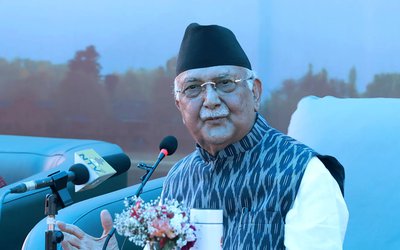More on News

Journalists are up in arms against the government demanding their safety. The current round of protest is a sequel to the assault on Khilanath Dhakal, a Biratnagar-based correspondent of the Nagarik daily, by activists of the Youth Force, the militant outfit of the Communist Party of Nepal-Unified Marxist Leninist (CPN-UML).
But the way the political parties, including the ones in the government, are responding to the incident makes it clear that they are more interested in taking political mileage out of the incident than in bringing the guilty to book.
Home Minister Krishna Bahadur Mahara went to the extent of asking Prime Minister Jhalanath Khanal to facilitate him in the handover of criminals to the police.
Does a Home Minister need Prime Minister's cooperation to hand over criminals to the police? Mahara, who is also a Maoist leader, was simply trying to send a message across that the Young Communist League and Youth Force are no different from each other, and that Maoists were being wrongly criticised by other parties all these years. In other words, he was also trying to strike a deal with the UML that the YCL-YF atrocities are political in nature, and their atrocities are best left to the Media for criticism.
Media, like the civil society, has been a party to encourage these extra-legal activities, of the outfits affiliated to one or the other political parties, especially during the past five years of political change. Political parties, especially the Nepali Congress and the Maoists, acquired an above-the-constitution status during the post-2006 phase. Together, they treated the parliament, the one that was revived and later the constituent assembly, as their rubber stamp. The rules and established practices were not guiding the business and conduct of parliament, but the whims of the top leaders of major parties were. Other parties like the UML and the media and civil society condoned these aberrations which took the scale of rules rather than exceptions blindly.
When media, even belatedly, tries to raise its voice against those practices and conduct of the political leaders, chances of their being targeted will naturally increase. Assault on Dhakal in Biratnagar by the Youth Force should be seen as a proof of that. The issue at the root of that assault lies in the correspondent's attempt to report corruption and crime in which the YF activists were allegedly involved.
In the past five years, the authority of the state reached near collapse. Part of it was transferred to or was being appropriated by political parties, mainly the big three. Prime Ministers and ministers using state funds on discretion, recruiting political cadres as diplomats, commissioners of the constitutional bodies, and, now, in the constitutional council, shows the parties are behaving more like the state without having to be accountable at all.
Who else, except the media, will raise their voices against these malpractices? A republican system means empowerment of the people. Treating political parties or their leaders as species above the law of accountability will encourage them to go totalitarian. But as major political parties and their leaders have appropriated the state's role and power in the past five years, even the constitutional bodies seem to treat them that way.
The recent decision of the Commission of Inquiry into the Abuse of Authority (CIAA) giving clean chits to Prime Ministers and Home Ministers in the 450-million Darfur scam by implicating only the police officials brings a dangerous drift in the country's polity. A constitutional body's servility towards political bosses is a clear sign of either a totalitarian or an anarchic regime.
And interestingly, no top leader of the three major parties has owned up any responsibility for the part of corruption in the Darfur scam when they were either leading the government or at the helm of the Home Ministry.
Principles of accountability in governance became the biggest casualty during this period. This is where the civil society and the media, by virtue of their involvement in the movement for restoration of democracy of April 2006, developed proximity with these political parties after the political change even at the cost of their professional virtues and principles. They turned a blind eye when the three parties that have been leading the government alternatively indulged in corruption, mal-governance and
went to the extent of turning the state into a fief.
With the system of accountability gone, and with so less transparency on use of state funds by ministers and even the transfer of development funds to the political parties, a pliable CIAA will best suit the corrupt interest of these parties. An assault on independence of judiciary through an equally corrupt deal among the political parties like in selecting members of the Constitutional Council recently, and judges under political parties’ quota during the past four years clearly comes as a threat to the independence of judiciary. Can democracy survive in such circumstances?
There are fears that the Maoists are moving systematically in weakening the permanent institutions one after another. After the exit of the monarchy, weakening of the Nepal Army, judiciary and the media would best suit any totalitarian design.
With police discredited by the CIAA--apparently under political pressure-- Nepal Army being targeted in one or the other way would not be far away. The assault on the media by the Youth Force comes as a handy thing in the scheme. That suits the Maoists the most. When others perform the dirty job, Maoists stand to gain ultimately like all the times in the past.
